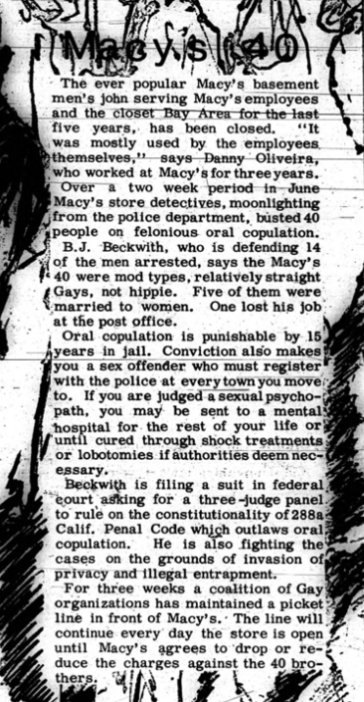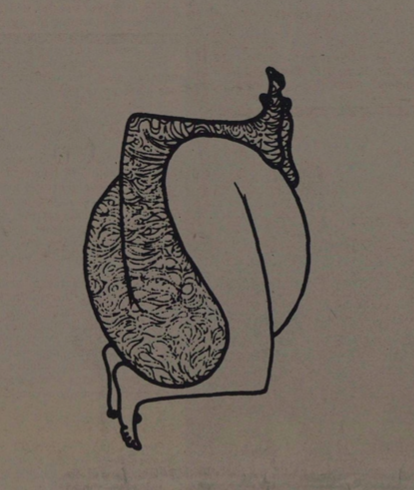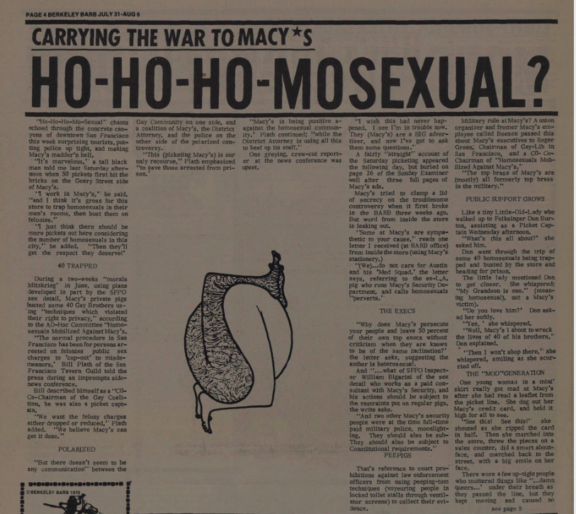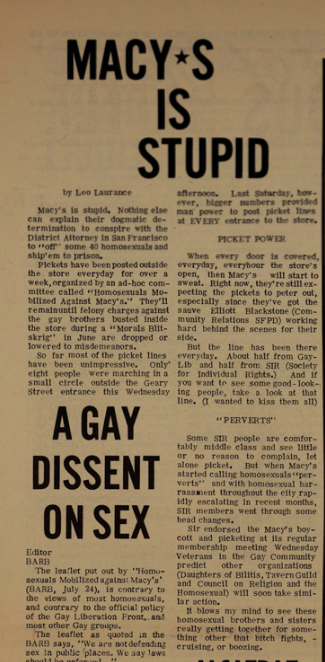In June 1970, Macy’s Department Store’s Security Team in San Francisco coordinated with the SF Police’s “sex detail” to entrap gay men crusing in their department store basement. This targeted attack against the gay community led to 40 arrests over a two week period, charging those arrested with “felonious oral copulation” under California Penal Code 288a. Many of the arrests were of Macy’s employees, the raids targeted working class men, not the executives who employees said also used the space. The Berkeley and San Francisco gay communities organized together to form “Homosexuals Mobilized Against Macy’s” and began a picket line in front of the store in late July.
Although the radical Gay groups had largely split from homophile groups like SIR, the two factions came together against Macy’s, demonstrating a radicalization of more conservative movments.
It’s a heavy thing,’ one SIR (Society for Individual Rights) member told me. ‘‘Five years ago, I’d never thought a second time of picketing.” But now I’m here, and I’m feeling GOOD!” (1)
But the line has been there everyday. About half from GayLib and half from SIR (Society for Individual Rights.)…Some SIR people are comfortably middle class and see little or no reason to complain, let alone picket. But when Macy’s started calling homosexuals “perverts” and with homosexual harrassment throughout the city rapidly escalating in recent months, SIR members went through some head changes. Sir endorsed the Macy’s boycott and picketing at its regular membership meeting Wednesday. Veterans in the Gay Community predict other organizations (Daughters of Bilitis, Tavern Guild and Council on Religion and the Homosexual) will soon take similar action. (2)
Picket line numbers were low from the start with only fifty people picketing the first weekend in July. However, by late August, the low turnout at the picket line impacted the sense of unity between the multiple movements. Members of the Gay Liberation began to turn on SIR and the Tavern Guild, blaming them for the lack of long-run mobilization against Macy’s.
The massive gay mobilization never materialized between the Gay Establishment (SIR & TGSF) and Gay-Lib of San Francisco. None are putting many members on the line. (3)
“There is no brotherhood in the Gay Community,” a studdish bartender at the Orpheum Circus said, talking about the disappointing picket lines at Macy’s. “It’s all money,” he said. “The bars want money. SIR wants money. People only help if they can make money.” (4)
The arrests at Macy’s articulated the Gay Liberation’s actions against the legal and prison system, which discriminated against gay people. The protests sparked a constitutional debate about California Penal Code 288a, which broadly regulated sexual acts, even between constenting adults as an attempt to criminalize homosexuality. The legal defense for the forty men arrested argued that the police illegally entrapped the individuals, a defense tactic common for the period.

Gay Sunshine, September 1970.
In California, Penal Code 286 outlawed sodomy, a crime that could be a life sentence. However, San Francisco Assemblyman Willie Brown first introduced bill #743 in 1969, which would decriminalize sodomy and other private sexual acts between consenting adults. The law was eventually passed in 1975, however Brown’s authorship of the bill was a major step for the gay community. It also demonstrated an alliance with the legal and prison reforms central to the Black Power movement, and their allies like Willie Brown in government.



